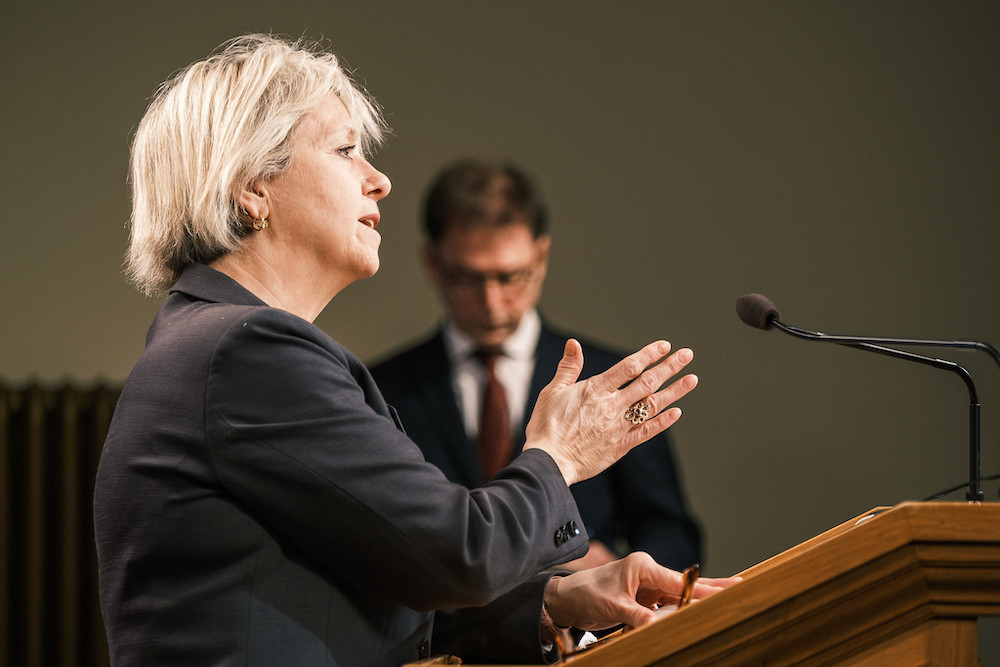Bans on sports activities and social gatherings outside your household have been extended for a third time as B.C. public health officials warned Thursday of a troubling upward trajectory in COVID-19 cases.
Restrictions that were set to end today have been extended for four weeks as B.C. reported 761 new cases of COVID-19, the highest daily total in more than a month.
Fraser Health accounted for 484 new cases, while Interior Health saw 96 new cases and 94 were reported in Vancouver Coastal Health. There were 23 cases in Island Health and 64 in Northern Health.
Eight more people died of COVID-19 on Thursday, while hospitalizations remained high, with 372 people in hospital and 74 in intensive care.
Provincial health officer Dr. Bonnie Henry said the trend shows some British Columbians ignored restrictions over the holidays.
“The number of new cases we’re seeing in every health authority shows that some people made a decision to make an exception of themselves,” she said.
It only takes a small group of individuals to put an entire community at risk, Henry said.
“If a few people in every town, every city or village in our province, make a small concession for themselves, that increases everyone’s risk exponentially.”
Henry said the significant uptick in cases also reflects a new reporting procedure that may have double-counted some previously reported cases.
In an effort to provide more timely data, labs will now send test results directly to the BC Centre for Disease Control for compilation into daily reports. They had been sending results to health authorities, which then sent them to the centre.
Henry and Health Minister Adrian Dix said this change will result in faster reporting, but create some uncertainty about results in the next few days during the transition.
“Every day the numbers... are a snapshot in time,” said Henry. “There will continue to be fluctuations as our numbers of cases are verified.”
“Every case is still counted, and every person who is tested is contacted as soon as possible.”
The province will also begin reporting weekly on cases and deaths linked to individual long-term care and assisted living facilities. On Thursday, there were 2,333 cases among staff and residents, more than 35 per cent of active cases in the province.
There are currently 51 active outbreaks in long-term care and assisted living.
Dix also said the province is issuing guidelines to clarify the definition of an essential visitor for those in long-term care and assisted living to ensure rules are being applied consistently across the province.
The current rules permit one designated social visitor, allowed one visit a week of about 30 minutes. Family members and others can apply to be declared an essential visitor to provide more frequent care, but approval is up to the home operator.
A group of caregivers and loved ones of people living in long-term care have said these guidelines are being applied unfairly and inconsistently by care homes, and want each resident to be guaranteed one essential visitor.
“The existing isolation and visitation limits in long-term care and assisted living arguably violate the security of the person and liberty rights of residents of care homes and the rights of their families,” wrote Karen Carteri, the group’s lawyer, in a Dec. 4 letter to Dix and the Office of the Provincial Health Officer.
In the guidance posted late Thursday, the ministry specified that “visits paramount to the resident’s physical care and mental well-being,” such as helping with personal care and feeding, can be considered essential.
It also clarified that each facility must publicly post the name and contact information of the administrator in charge of the decision to approve essential visits and have someone available immediately to family members wishing to appeal a decision.
Previously, all appeals had to go through the provincial Patient Care Quality Office first.
“Family and visitors can request an immediate review of the decision and shall be provided the ability to speak with an administrator or administrator on call,” reads the guidance.*
New information on B.C.’s deadliest outbreak in long-term care at Little Mountain Place in Vancouver has brought renewed focus on care standards and staffing issues in long-term care across the province.
Workers felt pressured to “push through” symptoms of COVID-19, the South China Morning Post reported on Thursday.
To date, 41 people have died — more than one-third of the facility’s 114 residents — and 99 per cent of residents and 70 per cent of staff have been infected.
Henry said the disproportionate COVID-19 toll on the elderly is why the province is prioritizing vaccinating all 70,000 long-term care residents, staff and essential visitors, aiming to finish by the end of this month.
But Henry said it is up to the rest of British Columbians to do their part to protect seniors and the elderly.
“Without a doubt there are brighter days ahead where thousands more will be immunized, the weather will be warmer and the spread of the virus will slow,” said Henry.
“It’s compassion and kindness and understanding that will get us through these dark days.”
*Story updated on Jan. 8 at 9:42 a.m. to include new information from the B.C. government. ![]()
Read more: Coronavirus
















Tyee Commenting Guidelines
Comments that violate guidelines risk being deleted, and violations may result in a temporary or permanent user ban. Maintain the spirit of good conversation to stay in the discussion.
*Please note The Tyee is not a forum for spreading misinformation about COVID-19, denying its existence or minimizing its risk to public health.
Do:
Do not: